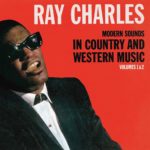There are a few albums so integral to the fabric of American music that they probably should be reissued every handful of years, just to be sure each successive generation of listeners gets exposed to their musical and cultural significance. Ray Charles’ duo volumes making up Modern Sounds in Country and Western Music, (here combined into a single CD), is one of those collections. And, while this reissue offers nothing new in terms of the music itself, it does commemorate the album’s return to vinyl and its first appearance on streaming platforms.
Volume 1 was initially released in 1962, and following its instant success, a second emerged a few months later. Charles achieved American Treasure status over the course of his four-decade career, and gave the world of music some of its most memorable performances. The two-dozen tracks that comprise this combined pair of albums give their fair share of contributions to that list, including the enduring hits “Born to Lose,” “Careless Love,” and, of course, “I Can’t Stop Loving You.”
Yet, even with the continued and lasting impressions these recordings make on audiences, it’s the cultural, social, and political climate during which they were first released that should be equally recognized. Today, an artist crossing into other genres represents nothing more than an artistic ambition, but it’s essential to the appreciation of these landmark records that the context within which Charles made them be recalled, as well. This was the early 1960s in America- a time when the battle for civil rights, especially in the Southern states, was a fierce struggle for justice and, in some cases, survival. For Charles, a native Georgian and a black artist labeled as an R&B singer, to take on the canon of country icons such as Hank Williams, Don Gibson, and Eddy Arnold, was to many a bold move, to say the least, and to some, potentially blasphemous.
Still, Charles was undeterred by the threat of criticism, let alone the threats of racism and prejudice, as he fought to get approval to make the album. His courage and brilliant musicianship were rewarded with a million-seller and a set of songs that redefined him forever as an artist without boundaries. While the lush, lilywhite background singers on some of the ballads may harken back to an era gone by, little about the music remains dated in its execution. And, perhaps ironically, those powdery vocals supporting Charles’ richly soulful tone suggest a hierarchy that history would prove out: Ray Charles’ voice is the one that sustains.



No Comments comments associated with this post